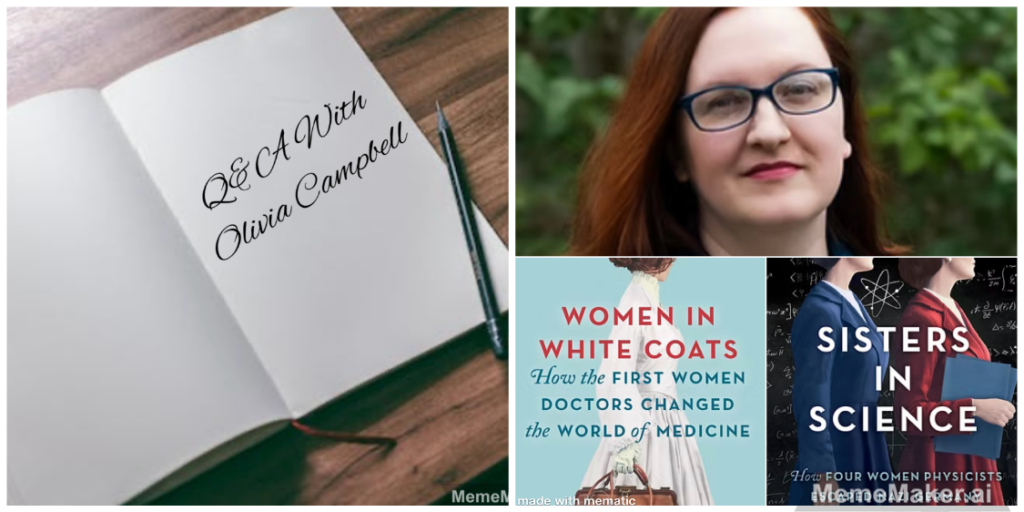Newsletters
Q&A With Olivia Campbell
New Information about Upcoming Book Related News
Q&A With Olvia Campbell
I’m so excited about doing this Q&A with New York Times bestselling author as well as an essayist & journalist Olvia Campbell. Olivia is the author of Women in White Coats & Sisters In Science which was released on December 31st 2024. Olivia discusses the intersections of medicine, women, history, and nature & her work discussing those topics have appeared in The Atlantic, Vanity Fair, New York Magazine/The Cut, History.com, The Washington Post, The Guardian, Aeon, Scientific American, Smithsonian Magazine, Literary Hub, Atlas Obscura, and Undark.
Q: Olivia would you please give a brief description of your historical fiction novels beginning with Sisters In Science? What drew you into writing historical fiction?
A: My books are historical, not historical fiction. They are nonfiction, not novels. Sisters In Science tells the extraordinary true story of four trailblazing women physicists forced to flee Nazi Germany. Against the backdrop of rising fascism, I discuss their incredible contributions to physics at a revolutionary time in scientific progress and their harrowing journeys out of Nazi territory.
Women in White Coats is about three Victorian women who broke down barriers in the medical field to become the first women doctors, revolutionizing the way women receive health care. It discusses their contributions to medicine and gender equality during a time of amazing progress in medicine. They faced a sea of sexism to achieve medical degrees but went on to establish women’s hospitals and medical schools.
Q: How long did it take you to research & write both Sisters In Science & Women in White Coats?
A: My first book, Women in White Coats, took a bit longer because I was new to writing a book and had to figure that process out. Each book took roughly four years to research, write, and edit. I was hoping to finish Sisters In Science even quicker, but it was a much bigger and more complicated story to piece together. It was also very emotionally draining given the subject matter. Deeply researched nonfiction takes a good three to four years (or more!), especially when you have caregiving responsibilities.
Q: What lessons & emotions do you hope readers learn after reading your books?
A: I hope readers come away from my history books both inspired and incensed. The amount of sexism and anti-Semitism leveled against these women was simply extraordinary. It should make everyone angry, but hopefully, also make them more invested in working to eradicate such bigotry. But to see these women persist and achieve despite it all, and to go beyond that to also help and mentor other women, well, that is totally inspiring.
Q: Congratulations on being on the New York Times Bestsellers List! Does it feel surreal knowing that your books have made the New York Times Bestsellers List?
A: It was a very surreal moment when my agent called me with the news that I was on the New York Times bestseller list. My book had been out in hardback for a year, and my paperback for a few weeks, so it was a very odd time for such an accomplishment to happen. Usually, it happens during the week of publication if it’s going to happen at all. But my paperback had been chosen by Costco for their stores, and I was the featured author in that month’s Costco Connection magazine. That visibility prompted the bestselling status of my first book, Women in White Coats.
Q: Can you reveal the details of your next book?
A: I have just sent my publisher two ideas for my next history book. One is a microhistory: the history of a topic/object throughout history. The other is about three female psychologists who challenged Sigmund Freud’s ideas about women (during his lifetime).
Q: Would you say that being a journalist & essayist helped in researching and writing your novels? For anyone wanting to submit their pieces in the publications you have, what is the submission process like?
A: Being a science journalist helped me understand how to explain science concepts in easy-to-digest ways and to translate the work and words of experts into reader-friendly stories. It has also given me a good ear for pinpointing quotes and anecdotes that not only build scenes and relate what my subjects said, but that also really tell us about my subjects and their personalities. Submitting to magazines and online outlets has been a matter of networking, connecting at science writing conferences, and reading submission guidelines closely.
Q: Does Hollywood have the rights to your work?
A: I have had some producers express some interest, but no contracts have been inked so far. Stay tuned!

